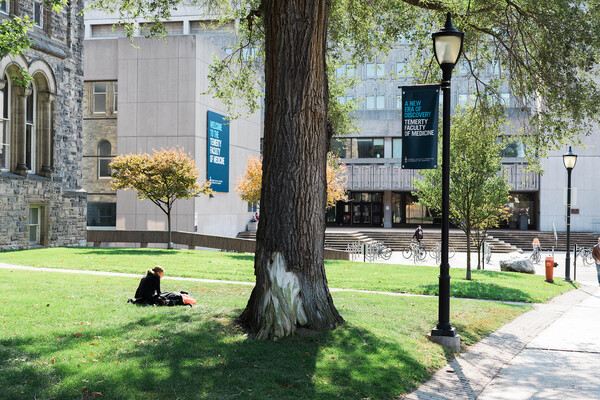Choosing a Graduate Program

Use our handy guide below to help you through the process of finding the right graduate program, understanding how funding works, applying, interviewing and finding a supervisor.
Explore Your Interests Early
- Find your interests early in your undergraduate years by visiting departmental and researchers’ websites and following up on lecture topics that have sparked your interest.
- Find out which undergraduate courses you need for your chosen graduate program and what grades you need for admission.
- Get hands-on undergraduate research experiences. These are important for admission to graduate departments and for obtaining a supervisor. Participate in research courses, project courses and summer research experiences. Visit our undergraduate research opportunity database to explore what's available.
- Explore affiliated hospitals and their research institutes.
- Talk to course instructors/professors, lab instructors, teaching assistants and graduate students in your area of interest.
- Use the U of T Blue Book bluebook.utoronto.ca to find professors.
- Speak with undergraduate and graduate student societies/unions, which often provide information sessions and seminars.
- Visit your career centre and speak to a career counselor about career management, networking, cover letters, resumes and interviews.
Research and Ask Questions
- Talk to course instructors/professors, lab instructors, teaching assistants and graduate students in your area of interest.
- Use the U of T Blue Book bluebook.utoronto.ca to find professors.
- Speak with undergraduate and graduate student societies/unions, which often provide information sessions and seminars.
- Visit your career centre and speak to a career counselor about career management, networking, cover letters, resumes and interviews.
- Find the right fit for you by looking at several programs.
- Know what you want to get out of the program and understand its admission requirements.
Questions to Consider:
- Is there a clear description of the program available to students?
- What is the average time to completion for students in this program?
- What is the course load?
- How is stipend funding arranged? Do you apply for competitive internal and external awards?
- What seminars and visiting lectures are open to students?
- Are there opportunities for formal student presentation of research?
Learn about Tuition and Funding
Tuition and Fees
The tuition and fees for each program is published on the Planning and Budget website.
Funding and Awards
The funding and awards you may be eligible for will depend on which program you apply to. In general, if you apply to a thesis-based research program, you will be eligibile to recieve Temerty Faculty of Medicine Harmonized Base Funding. This funding will cover the cost of your program tuition and your living expenses. You would also be eligible to apply for certain awards. Take some time to review our Funding for Research-Stream Graduate Students page.
If you apply to a professional or clinical program, you will be responsible for paying your program tuition and fees and living expenses using your own resources, although you may be eligible to apply for bursaries and awards. You can learn more about Funding for Professional-Stream Graduate Students on our website.
The School of Graduate Studies also provides an overview of how funding works in thesis-based programs and how funding works in professional programs.
Apply
- Read the School of Graduate Studies (SGS) and department websites carefully to learn how to apply.
- Start applying at least one year before starting a program. Programs can be competitive and there are a limited number of graduate research positions available.
- You submit an application for most programs using Grad App. If you are applying to a Professional Master's degree in the Clinical Rehabilitation Sciences (MScOT, MScPT, MHSc in speech-language pathology) apply through the Ontario Rehabilitation Program Application Service (ORPAS).
- Keep track of application deadlines in departments and SGS.
- Contact your references ahead of time to let them know they may be asked for a reference.
- Choose a Faculty member who knows of your interest in research and who can provide an evaluation of work habits and research skills. Make sure you give your reference time to write something meaningful.
- When you contact your potential supervisor by email, include a cover letter describing your research interests, program and year of study, and career goals. Include a copy of your resume and transcript (see more information on selecting a supervisor below).
Prepare for your Interview
- You will be interviewed by a departmental admissions committee. Please bring a copy of your cover letter, resume, names and contact addresses of potential referees, and if applicable, a portfolio or samples of your work (e.g., old lab notebooks from undergraduate lab courses).
- Be ready to talk about your interests and research.
- Ask questions about the department. The interview is also your opportunity to further evaluate the department.
- Follow up after your interview and stay in touch.
Find a Supervisor
- Acceptance to a graduate program is conditional on acceptance by a graduate supervisor who can fulfill the department requirements for supervision, which include providing student stipends as applicable.
- Choosing the right supervisor is important. You should contact several potential supervisors to increase your chances. Send each one an individual message, address the professor by name and show you are knowledgeable about the professor’s field of research.
- In most cases, supervisors are identified after you’ve been admitted to the department. Some departments will allow you to rotate through a few laboratories before a final decision on supervision is made.
- The interview with a potential supervisor is critical. Know the scientist’s work very well. Be able to communicate why you want to train in the laboratory. Be ready to talk about any research you have done in the past. Use the questions below to find out about the supervisor and the laboratory.
- How does the supervisor run his or her laboratory/research program?
- What are the expectations of the supervisor for his or her students?
- Are students encouraged to become independent, explore their ideas and take charge of their own projects?
- How often are formal meetings held with supervisors?
- What peer support is there in the laboratory/research group?
- Is there enough space and equipment? Is the supervisor well-funded?
- Does the supervisor provide feedback in a timely manner?
- Do students finish their program, course work and thesis in a timely fashion?
- Does the supervisor encourage students to participate and present at national and international conferences?
- Do students publish first-authored, high-quality work?
- Does the supervisor support your career goals and participation in activities outside the laboratory and research program?
- Visit the research environment and talk to current students to get their perspective on the environment.
- Remember: your supervisor will also be your mentor. That relationship will help shape your career, so you need to be able to talk about your aspirations and goals together.
